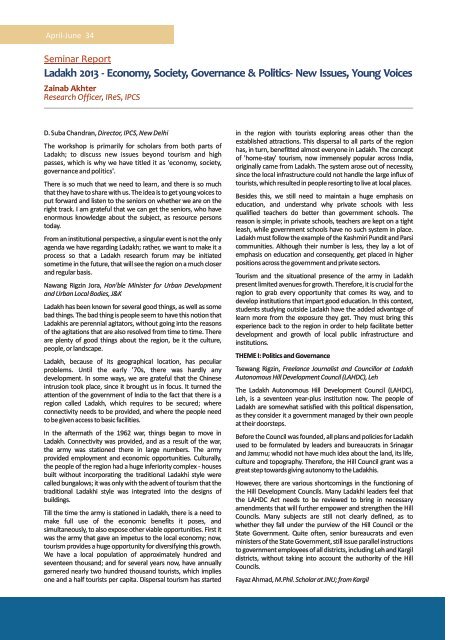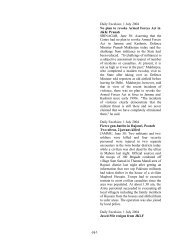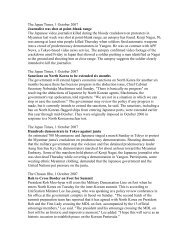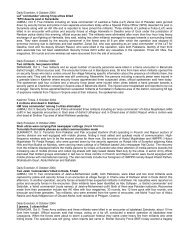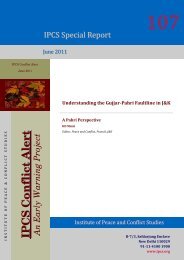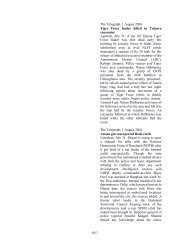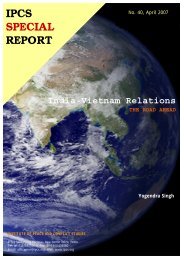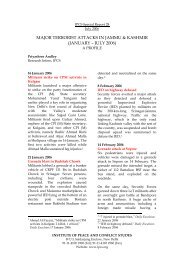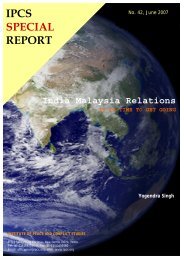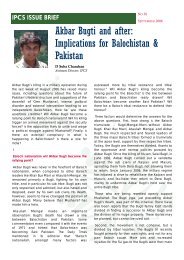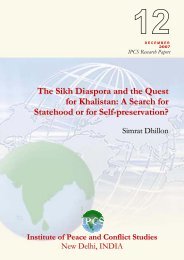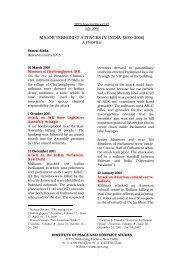April-June 2013 - Institute of Peace and Conflict Studies
April-June 2013 - Institute of Peace and Conflict Studies
April-June 2013 - Institute of Peace and Conflict Studies
Create successful ePaper yourself
Turn your PDF publications into a flip-book with our unique Google optimized e-Paper software.
<strong>April</strong>-<strong>June</strong> 34<br />
Seminar Report<br />
Ladakh <strong>2013</strong> - Economy, Society, Governance & Politics- New Issues, Young Voices<br />
Zainab Akhter<br />
Research Officer, IReS, IPCS<br />
D. Suba Ch<strong>and</strong>ran, Director, IPCS, New Delhi<br />
The workshop is primarily for scholars from both parts <strong>of</strong><br />
Ladakh; to discuss new issues beyond tourism <strong>and</strong> high<br />
passes, which is why we have titled it as 'economy, society,<br />
governance <strong>and</strong> politics'.<br />
There is so much that we need to learn, <strong>and</strong> there is so much<br />
that they have to share with us. The idea is to get young voices to<br />
put forward <strong>and</strong> listen to the seniors on whether we are on the<br />
right track. I am grateful that we can get the seniors, who have<br />
enormous knowledge about the subject, as resource persons<br />
today.<br />
From an institutional perspective, a singular event is not the only<br />
agenda we have regarding Ladakh; rather, we want to make it a<br />
process so that a Ladakh research forum may be initiated<br />
sometime in the future, that will see the region on a much closer<br />
<strong>and</strong> regular basis.<br />
Nawang Rigzin Jora, Hon'ble Minister for Urban Development<br />
<strong>and</strong> Urban Local Bodies, J&K<br />
Ladakh has been known for several good things, as well as some<br />
bad things. The bad thing is people seem to have this notion that<br />
Ladakhis are perennial agitators, without going into the reasons<br />
<strong>of</strong> the agitations that are also resolved from time to time. There<br />
are plenty <strong>of</strong> good things about the region, be it the culture,<br />
people, or l<strong>and</strong>scape.<br />
Ladakh, because <strong>of</strong> its geographical location, has peculiar<br />
problems. Until the early '70s, there was hardly any<br />
development. In some ways, we are grateful that the Chinese<br />
intrusion took place, since it brought us in focus. It turned the<br />
attention <strong>of</strong> the government <strong>of</strong> India to the fact that there is a<br />
region called Ladakh, which requires to be secured; where<br />
connectivity needs to be provided, <strong>and</strong> where the people need<br />
to be given access to basic facilities.<br />
In the aftermath <strong>of</strong> the 1962 war, things began to move in<br />
Ladakh. Connectivity was provided, <strong>and</strong> as a result <strong>of</strong> the war,<br />
the army was stationed there in large numbers. The army<br />
provided employment <strong>and</strong> economic opportunities. Culturally,<br />
the people <strong>of</strong> the region had a huge inferiority complex - houses<br />
built without incorporating the traditional Ladakhi style were<br />
called bungalows; it was only with the advent <strong>of</strong> tourism that the<br />
traditional Ladakhi style was integrated into the designs <strong>of</strong><br />
buildings.<br />
Till the time the army is stationed in Ladakh, there is a need to<br />
make full use <strong>of</strong> the economic benefits it poses, <strong>and</strong><br />
simultaneously, to also expose other viable opportunities. First it<br />
was the army that gave an impetus to the local economy; now,<br />
tourism provides a huge opportunity for diversifying this growth.<br />
We have a local population <strong>of</strong> approximately hundred <strong>and</strong><br />
seventeen thous<strong>and</strong>; <strong>and</strong> for several years now, have annually<br />
garnered nearly two hundred thous<strong>and</strong> tourists, which implies<br />
one <strong>and</strong> a half tourists per capita. Dispersal tourism has started<br />
in the region with tourists exploring areas other than the<br />
established attractions. This dispersal to all parts <strong>of</strong> the region<br />
has, in turn, benefitted almost everyone in Ladakh. The concept<br />
<strong>of</strong> 'home-stay' tourism, now immensely popular across India,<br />
originally came from Ladakh. The system arose out <strong>of</strong> necessity,<br />
since the local infrastructure could not h<strong>and</strong>le the large influx <strong>of</strong><br />
tourists, which resulted in people resorting to live at local places.<br />
Besides this, we still need to maintain a huge emphasis on<br />
education, <strong>and</strong> underst<strong>and</strong> why private schools with less<br />
qualified teachers do better than government schools. The<br />
reason is simple; in private schools, teachers are kept on a tight<br />
leash, while government schools have no such system in place.<br />
Ladakh must follow the example <strong>of</strong> the Kashmiri Pundit <strong>and</strong> Parsi<br />
communities. Although their number is less, they lay a lot <strong>of</strong><br />
emphasis on education <strong>and</strong> consequently, get placed in higher<br />
positions across the government <strong>and</strong> private sectors.<br />
Tourism <strong>and</strong> the situational presence <strong>of</strong> the army in Ladakh<br />
present limited avenues for growth. Therefore, it is crucial for the<br />
region to grab every opportunity that comes its way, <strong>and</strong> to<br />
develop institutions that impart good education. In this context,<br />
students studying outside Ladakh have the added advantage <strong>of</strong><br />
learn more from the exposure they get. They must bring this<br />
experience back to the region in order to help facilitate better<br />
development <strong>and</strong> growth <strong>of</strong> local public infrastructure <strong>and</strong><br />
institutions.<br />
THEME I: Politics <strong>and</strong> Governance<br />
Tsewang Rigzin, Freelance Journalist <strong>and</strong> Councillor at Ladakh<br />
Autonomous Hill Development Council (LAHDC), Leh<br />
The Ladakh Autonomous Hill Development Council (LAHDC),<br />
Leh, is a seventeen year-plus institution now. The people <strong>of</strong><br />
Ladakh are somewhat satisfied with this political dispensation,<br />
as they consider it a government managed by their own people<br />
at their doorsteps.<br />
Before the Council was founded, all plans <strong>and</strong> policies for Ladakh<br />
used to be formulated by leaders <strong>and</strong> bureaucrats in Srinagar<br />
<strong>and</strong> Jammu; whodid not have much idea about the l<strong>and</strong>, its life,<br />
culture <strong>and</strong> topography. Therefore, the Hill Council grant was a<br />
great step towards giving autonomy to the Ladakhis.<br />
However, there are various shortcomings in the functioning <strong>of</strong><br />
the Hill Development Councils. Many Ladakhi leaders feel that<br />
the LAHDC Act needs to be reviewed to bring in necessary<br />
amendments that will further empower <strong>and</strong> strengthen the Hill<br />
Councils. Many subjects are still not clearly defined, as to<br />
whether they fall under the purview <strong>of</strong> the Hill Council or the<br />
State Government. Quite <strong>of</strong>ten, senior bureaucrats <strong>and</strong> even<br />
ministers <strong>of</strong> the State Government, still issue parallel instructions<br />
to government employees <strong>of</strong> all districts, including Leh <strong>and</strong> Kargil<br />
districts, without taking into account the authority <strong>of</strong> the Hill<br />
Councils.<br />
Fayaz Ahmad, M.Phil. Scholar at JNU; from Kargil


